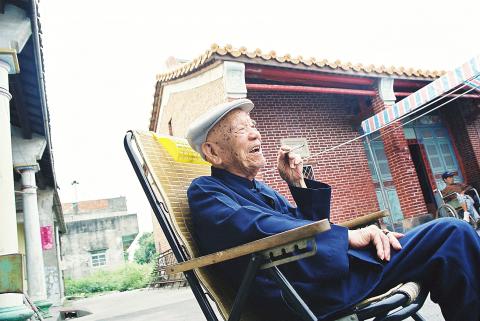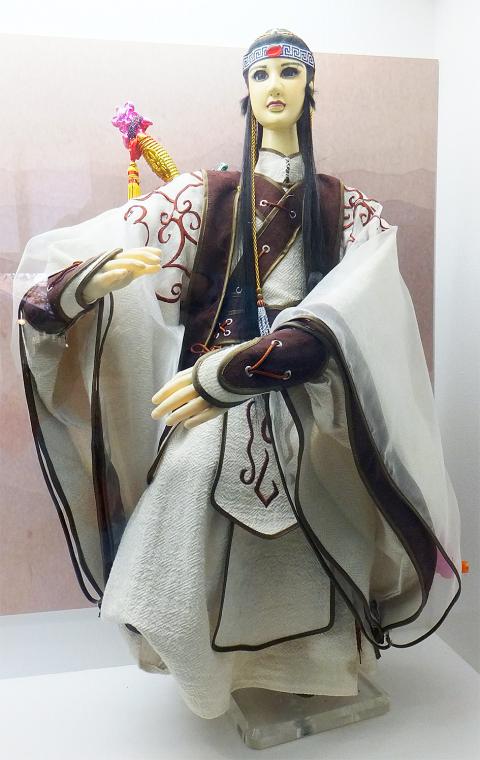Taiwan in Time: Dec. 28 to Jan. 3
The moment the Japanese police left the scene to drink elsewhere, Huang Hai-dai (黃海岱) knew it was his time to shine.
The legendary puppet master dropped the kimonos and Japanese soundtracks, brought out the hidden traditional gongs and drums while the audience waited in anticipation for what they really came to watch.

Photo courtesy of Pili International Multimedia
With people keeping an eye on the theater entrance in case the police came back, the performance continued late into the night. If caught, Huang’s troupe would be accused of staging a private show and might even be beaten and having its license suspended.
It was the late 1930s and Japanese invasion of China was in full swing. The new imperialist policy in Taiwan was to “Japanize” the population and eradicate local culture, including the puppet shows.
Because the shows were such an integral part of local culture — especially those staged during various holidays to celebrate the gods — the Japanese decided to keep a few troupes around to avoid public fury.

Courtesy of Wikimedia Commons
Huang’s Wuzhouyuan (五洲園) was one of them, but they could only stage government-approved productions with the puppets wearing Japanese garb performing to Japanese or Western tunes. The actors were allowed to speak Hoklo (commonly known as Taiwanese), but it had to be peppered with Japanese phrases. All traditional instruments were banned.
Huang only complied when the Japanese were around. Born on Jan. 2, 1901 in today’s Yunlin County, he was a proud student of Han-Chinese culture. His father, also a puppeteer, didn’t have money to send him to Japanese school, so he would travel every day to learn from a Taiwanese teacher. There, he read literary classics and became familiar with the heroic and historic novels that would later become the basis of his work.
Huang took over his father’s troupe at the age of 24 and renamed it Wuzhouyuan, with zhou referring to an administrative district during the Japanese era.
His ambition was clear here — his goal was to be known throughout all five zhou in Taiwan. His group started out with shows depicting the solving of famous legal cases, and later started putting on adaptations of martial arts novels, which were much more fast-paced and entertaining than the audience was used to. He also stood out because he was able to write his own scripts.
Life was frequently on the road, with an annual trip to Tainan during Ghost Month to perform daily shows to appease the gods for two months straight. He also had precise control of his nasal cavity, lips, teeth, tongue, throat and dantian (丹田, energy center) in order to accurately personify characters of any gender, disposition and age — to the point that he said even a blind person could enjoy the show.
His son, Huang Feng-shih (黃逢時) says in a biography that his father believed that puppetry could inspire people and bring culture to the masses, thus his shows always had elements of “good against evil, loyal against cunning as well as the chivalrous spirit and tender heart (of martial arts heroes).”
Huang’s troupe enjoyed huge popularity after the Japanese defeat, but he slowly retreated behind the scenes, leaving the big stage to his sons and many disciples.
His most famous creation is perhaps Shih Yan-yun (史炎雲), who appeared in his show Anthology of the Loyal, Brave, Filial and Righteous (忠勇孝義傳), adapted from a Qing Dynasty book that was banned during the Japanese era.
Another son, Huang Chun-hsiung (黃俊雄) revised the story into The Scholarly Swordsman of Yunzhou (雲州大儒俠) and renamed the character Shi Yan-wen (史艷文), who is almost synonymous with Taiwanese puppet theater even today.
The younger Huang brought puppetry to new heights by turning the performances into a television show. Debuting in March 1970, it set a record television rating of 97 percent as students reportedly skipped class while farmers left their fields to watch the swordsman lead a band of heroes against evil forces.
The government banned the show a few years later under the grounds of “disrupting the nation’s labor schedule,” but Huang recalls later that the real reason was that it used Hoklo, which conflicted with the Mandarin-centric government policy.
The show resumed in 1987 and continued on national television until 2003. Huang Hai-dai died in 2007, but his legacy continues in his many grandchildren who strive to keep traditional puppetry alive.
Taiwan in Time, a column about Taiwan’s history that is published every Sunday, spotlights important or interesting events around the nation that have anniversaries this week.

Every now and then, it’s nice to just point somewhere on a map and head out with no plan. In Taiwan, where convenience reigns, food options are plentiful and people are generally friendly and helpful, this type of trip is that much easier to pull off. One day last November, a spur-of-the-moment day hike in the hills of Chiayi County turned into a surprisingly memorable experience that impressed on me once again how fortunate we all are to call this island home. The scenery I walked through that day — a mix of forest and farms reaching up into the clouds

With one week left until election day, the drama is high in the race for the Chinese Nationalist Party (KMT) chair. The race is still potentially wide open between the three frontrunners. The most accurate poll is done by Apollo Survey & Research Co (艾普羅民調公司), which was conducted a week and a half ago with two-thirds of the respondents party members, who are the only ones eligible to vote. For details on the candidates, check the Oct. 4 edition of this column, “A look at the KMT chair candidates” on page 12. The popular frontrunner was 56-year-old Cheng Li-wun (鄭麗文)

“How China Threatens to Force Taiwan Into a Total Blackout” screamed a Wall Street Journal (WSJ) headline last week, yet another of the endless clickbait examples of the energy threat via blockade that doesn’t exist. Since the headline is recycled, I will recycle the rebuttal: once industrial power demand collapses (there’s a blockade so trade is gone, remember?) “a handful of shops and factories could run for months on coal and renewables, as Ko Yun-ling (柯昀伶) and Chao Chia-wei (趙家緯) pointed out in a piece at Taiwan Insight earlier this year.” Sadly, the existence of these facts will not stop the

Oct. 13 to Oct. 19 When ordered to resign from her teaching position in June 1928 due to her husband’s anti-colonial activities, Lin Shih-hao (林氏好) refused to back down. The next day, she still showed up at Tainan Second Preschool, where she was warned that she would be fired if she didn’t comply. Lin continued to ignore the orders and was eventually let go without severance — even losing her pay for that month. Rather than despairing, she found a non-government job and even joined her husband Lu Ping-ting’s (盧丙丁) non-violent resistance and labor rights movements. When the government’s 1931 crackdown